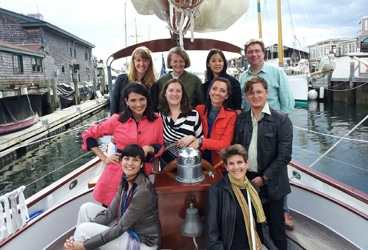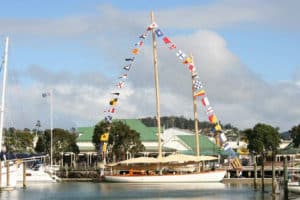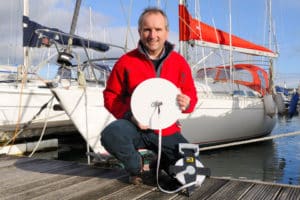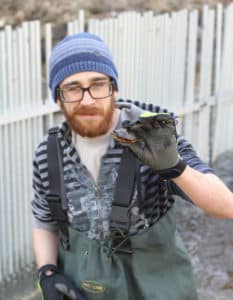
Metcalf Institute group
For years, the rugged fishing trawler got under my skin.
I’d dip the oars of my rowing skiff more slowly whenever I approached it. The hull was a bit worn around the side decks yet neat in its appearance and seeming sense of purpose—the University of Rhode Island stickers and designation r/v, for research vessel, in front of the name, Cap’n Bert, gave off obvious hints.
I’d drift by its slip at the shipyard in Wickford, Rhode Island, eying its A-frame transit at the stern, the unvarnished wood caprails, and the round, bright orange plastic scallop basket suspended high in the cables, a daytime signal that this craft might be towing nets and gear.
This boat, so still in the water, made me wonder: What did it catch, where did it trawl, who used it? I’d watch from our nearby slip and never saw anyone around it, but everyone at the shipyard assured me that the trawler went out. University research stuff, they always said. Probably never see anything because we’re out sailing Land’s End, our Crocker ketch, when Bert‘s crew’s aboard, I’d muse.
Then, on a Wednesday morning earlier this month, everything changed and my vague notions about the good ship Cap’n Bert became tactile. Astonishingly, I was aboard, and about to head out on her, because I was on a weeklong fellowship with the Michael P. Metcalf Institute for Marine & Environmental Reporting.
Among many programs, the institute holds an annual workshop; this was its fourteenth, with the theme Coastal Impacts: Global Change in Coastal Ecosystems. It’s a nonstop bombardment of journalists with juicy data, fieldwork, lectures, reading, and seminars on a mission toward improving their understanding of the way scientists work and how they communicate their science. It’s described as an immersion experience, and believe me, I was immersed—super saturated, actually.
Part of Metcalf’s heft is tied to its home, situated on the campus of the acclaimed University of Rhode Island Graduate School of Oceanography. It’s evolved into a significant waypoint for internationally renown scientists, researchers, news media professionals, and writers, attracting a global audience and applicant pool.
If you’re a sailor, it’s a no brainer why I sought it out. Who better knows, understands, or cares about the water than us?
Think about it. We live in an age of dramatically shifting natural resources and climate; sailors share the water with all types of marine users; sailors and their boats are sensitive to shifts in the marine environment. Clean water, as well as healthy land- and marine-based food webs, are high priorities. If you want to get a handle on climate change and the variety of beliefs and attitudes about it, start with the Yale Project on Climate Change Communication.
What Metcalf nurtures and showcases, and what the scientists and students at GSO research and discover, is ground breaking and relevant to our survival on the water and the survival of the planet overall. How could I not make a good effort to get into this?
Daily, we covered a lot of territory, literally and figuratively (View a gallery of photos from the week here). We interpreted graphs, and got an introduction to the significance of collecting data and doing research over long periods of time. We hit the road to take salinity, wind, oxygen, and temperature readings of sub estuaries off Narragansett Bay. We took water and sediment samples off the pier at the GSO campus, situated at the waterfront of the bay’s West Passage. We attended dinners, public lectures, did our homework (yes, there was plenty of reading and writing, too). We learned about newly studied pollutants and contaminants in our air and water. We also learned that the GSO fish trawl survey marks its 53rd year in 2012, and its information is used by scientists around the world. The data on fish species collected aboard the Cap’n Bert aid in ongoing research assessing long-term trends in fisheries.
By the time we climbed aboard the trawler, we were deep in to our work, our workshop environment, and our newly formed friendships. Our energetic group had already managed to squeeze in a bit of late-night carousing. We were a diverse bunch and included an NPR affiliate reporter from Unalaska, in the Aleutian Islands, a television producer from Poland, an editor from CNN’s Atlanta headquarters, and a writer from a daily newspaper in Singapore. Through it all, my brain was near-bursting with science, learning, and socializing, and it felt great. Questions ceaselessly flowed, and I struggled to quiet my mind. Did I mention that it felt great?
Here’s another thing any sailor can savor: The chosen day of our trawler excursion kicked off sunny, warm, and bright. After a raw, windy, rainy start to the workshop, we relished the change. I peeled off my foulies and took in my surroundings on the after deck of the Cap’n Bert. At last, the mysteries are unraveling, I thought to myself with a smile.
“Anna, ready to get the net?” Captain Tom Puckett called out to crewmate and researcher Anna Malek.
Was she ever. And so was I, even before the haul was reeled in.
Tell Us What You’re Doing
All over the globe, sailors are finding new ways to make a difference, big and small, in the environment. Share stories and pictures at greenwakes@cruisingworld.com
Check out the America’s Cup World Series in Newport, Rhode Island
Exhibits and daily talks about marine health, water pollution, and climate change showcasing the work of the Graduate School of Oceanography at the University of Rhode Island are part of the event from June 22 to July 1, 2012.







